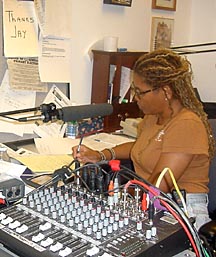After the Sept. 11 attacks
Rattled and ousted from studios, WNYC keeps news on the airOriginally published in Current, Sept. 24, 2001
By Mike JanssenThe rule is that journalists should keep a distance from their subjects, but that was just a fantasy for reporters at New York's public radio stations when hijacked airliners demolished the World Trade Center.
Reporters and producers for WNYC were forced to leave their offices in the city's municipal building, a few blocks northeast of the trade center, when the attacks prompted an evacuation. Some of the news team eventually moved to NPR's small New York bureau in midtown Manhattan, where they turned NPR Vice President of Programming Jay Kernis's office into a makeshift production studio.
"Thank God he's immaculate," says Dean Cappello, WNYC's v.p. of programming and operations. "His office was ready to move into."
Other staffers ended up producing talk programming out of the studios of WKCR, Columbia University's student station in upper Manhattan.
Though the news division lacked any kind of central headquarters for a time, it managed to provide live coverage of the breaking news that hit New York harder than anywhere else in a country reeling from the events.
Throughout the day, reporters acted on their instincts, often unable to contact each other or their supervisors. Cappello emerged from the subway just after the second plane hit the World Trade Center and WNYC's offices were already being evacuated. He ran into reporter Beth Fertig in the street.
"We were having a not particularly calm conversation about where she should go," Cappello says. "She said she'd try to get closer to the Trade Center, and I said, 'Please don't do anything dumb, or anything that might get you hurt.'"
Fertig headed south, and Cappello was walking in the opposite direction when moments later he heard what he says "sounded like the low rumble of an aircraft." But fears of a third plane dissipated and gave way to a worse reality—the first tower collapsed, and Fertig was heading toward it. Cappello did not know what became of her until he heard her deliver a live report on WNYC, put on the air by several Morning Edition staffers who had refused to leave the municipal building until evening. (WNYC-AM stayed on the air, but the transmitter for its sister FM station went down with the World Trade Center. Story, page 1.)
As Tuesday's stunning aftermath unfolded, WNYC's staff had to overcome the sealing-off of Manhattan and the shutdown of public transportation to keep doing their work. Reporter Marianne McCune hitched a ride from Brooklyn with a bike messenger. Cappello says he and a producer got a ride uptown with "a couple of dot-commers" who were listening to WNYC in their Range Rover.
Cappello and other WNYC executives found themselves forced to make life-or-death decisions about how to direct their staff. "There was the news mission, and there was the human mission—and buildings in the area were falling," he says. "That was the really hard part. It's a story to cover, but it's a story unlike any other, because we were all traumatized in some way by it."
Fifteen miles from the World Trade Center, Bronx-based WFUV, a triple-A format station, expanded its news coverage and altered its music mix to reflect the events. "You wouldn't usually play Samuel Barber's 'Adagio for Strings,'" says Program Director Chuck Singleton. But WFUV did, and also added spirituals, such as Louis Armstrong singing "Nobody Knows the Trouble I've Seen."
While some public radio stations abandoned music entirely, Singleton says listeners appreciated WFUV's balance. "They love that we didn't go all news, and yet didn't abandon the world, either," he says.
Jo Ann Allen broadcasts WNYC from the borrowed New York desk of NPR program chief Jay Kernis.
. To Current's home page . Related stories: Sept. 11 coverage by public TV and NPR; effects on New York stations and canceled meetings in public broadcasting.
Web page posted Sept. 27, 2001
Current
The newspaper about public television and radio
in the United States
A service of Current Publishing Committee, Takoma Park, Md.
E-mail: webcurrent.org
301-270-7240
Copyright 2001

